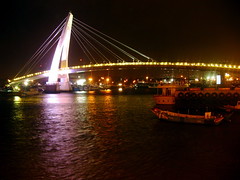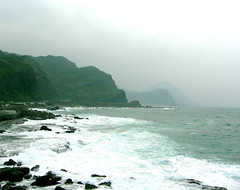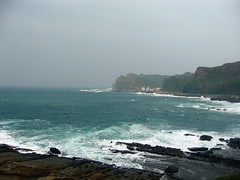Dear Readers,
As you know, I am sometimes bored out of my mind, sitting in an A/Ced office in the Academia Sinica in Taipei, Taiwan.
Sometimes boredom leads to inspiration, other times, it leads to totally insipid blathering. After reading my post from yesterday, I've decided some clarifications needed to be made before debating the arms budget (i.e. whether Taiwan should purchase over $18 billion dollars worth of US made military hardware).
There are a lot of dichotomies in the whole Taiwan vs China debate (ha, see?):
Some include,
Unification with China versus Independence from China
Pro-Taiwan politicians versus Pro-China politicians
I see many problems with these groupings. And although in my last post, I felt it necessary to point out that hardened, polarized viewpoints on Taiwan's eventual future with China are of the norm, it is still necessary to point out several misnomers or terms that are always certain to be taken for granted by the media.
One of these misnomers is "Independence, or pro-inpendence" as a political road to be taken by Taiwan.
Because the Chinese government tends to a have an obsessive proclivity to label any politician in Taiwan who does not submit to Chinese rule as a "separatist", it tends to galvanize domestic support in Taiwan for politicians who run on political platforms that outwardly show defiance toward the Beijing government. They have monopolized the label: "pro-independence forces". Whether they really do enact policies that help benefit Taiwan's sovereignty and continued independence is hardly questioned: these people are obviously, pro-Taiwan. Meanwhile, again mainly because of the Chinese government's insistence of using Stalinist propaganda with regards to Taiwan's international status, many domestic forces within Taiwan that wish to foster a more concillitory tone with Beijing become "pro-unification, pro-China forces." Often, they are accused of "selling" Taiwan up the river to Beijing. Nevermind the possibility that a concillitory approach (while perhaps less palitable and face-saving) with China can bring long term peace and material benefits to Taiwanese and Chinese people alike, these people are Pro-China...and pro-China is pretty much akin to anti-Taiwan.
It may seem ludicrous hair splitting, but I think the political and media pundits alike in Taiwan and worldwide new to rectify the terms they use.
In so doing, we need better definitions for what it means for Taiwan to be independent. Today, just as more than fifty years ago, Taiwan has not been administered in any way, shape or form by the current Communist government called the People's Republic of China. We need to consider what international and domestic forces were and are behind this great deal of freedom Taiwan has enjoyed. What does declaring independence today mean? What purpose does it serve? Whose interests are involved? Perhaps we should use the word "security" in lieu of independence. It's a bit more specific, less partisan, and even less liable to obsfucation from PRC ideological garbage.
Closely linked to this is the pairing: "Pro-Taiwan/Pro-China". If we have to use the term Pro-Taiwan politicians in the political lingo on this island, it obviously means that there are Anti-Taiwan forces at play. But what we shouldn't necessarily equate as equal entities of the same ilk are the Anti-Taiwan and Pro-China forces. Can we account for the possibility of a Pro-China and Pro-Taiwan force existing in tandem? Why or why not?
That's all the hairsplitting for the moment. Next time, I'll consider why Taiwan and China need a lot more mutual understanding above all else. After that, perhaps we'll be in a better position to begin debating the arms package, the recent PRC "Anti-Secession Law" (read: male-cattle excrement) and what the recent domestic elections in Taiwan will mean for current cross-Strait relations. Peace for both sides.



